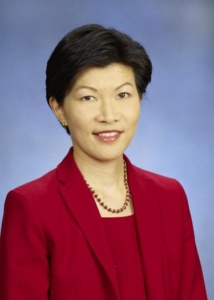 Welcome to The Glass Hammer’s Spotlight on Asia Week. We’ll be featuring profiles of successful business women working in Asia all week long!
Welcome to The Glass Hammer’s Spotlight on Asia Week. We’ll be featuring profiles of successful business women working in Asia all week long!
By Michelle Hendelman, Editor-in-Chief
Wei Hopeman, Managing Director and Head of Asia for Citi Ventures, stresses the importance of taking risks, embracing the unknown, and cultivating strong relationships in business. Hopeman joined Citi Ventures in 2010 to lead activities in Asia, which is the venture investing and innovation arm of Citi. “We act as the eyes and ears that identify new technologies to bring into Citi to help our company stay ahead of the competition,” said Hopeman.
Career Path
When she first started out in the in financial industry, Hopeman worked as a buyside analyst on the Asian portfolio of a Los Angeles based firm. “The Asian portfolio was about one billion dollars. I was asked if I wanted to move to Hong Kong to help set up the Asian office for the firm,” recalled Hopeman. “I jumped at the opportunity, which was such an amazing experience for someone my age.”
After successfully establishing the Hong Kong office for her firm, Hopeman decided to take a detour from the traditional career path in finance when she received a phone call from a friend about joining a new real estate start-up. “I knew nothing about real estate or running a start-up, but I saw it as a great opportunity,” said Hopeman. “We started in a 10×10 windowless office, raised capital, hired a staff, and developed a business plan. Eventually we grew from just two people to having offices in Hong Kong, Japan, and China.”
Although it was somewhat of a departure from her career in finance, Hopeman values the time she spent growing her start-up. “Even though this experience happened early on in my professional life, it played a huge role in how I viewed the rest of my career. It taught me that you shouldn’t be intimidated by things you don’t know because you can always figure it out if you are smart and hard-working.”
After successfully fulfilling her goals as an entrepreneur, Wei returned to the financial services industry and spent a couple of years working for an Investment Banking and Private Equity firm whose primary focus was helping European multinational companies complete strategic acquisitions in Asian markets. Always looking for the next opportunity, Hopeman decided that it was time for her to expand her industry knowledge by attending business school at Stanford.
“In business school I caught the technology bug and fell in love with the Bay area,” Hopeman said. She continued, “I became a technology investment banker and spent the next eight years learning about emerging technologies and helping technology companies with strategic initiatives.” During this time Hopeman was presented with another opportunity to relocate to Asia and help her firm establish an office in this market.
In her current role with Citi Ventures, Hopeman spends a lot of time thinking about ways to keep Citi one step ahead of the competition. “We are facing some non-traditional competitors in our industry right now like Google, Amazon, and Alibaba who are creating customer centric and data driven financial services with the end user in mind. This makes us think about new ways of conducting our traditional business and how to enhance the customer experience with new technologies and capabilities.”









